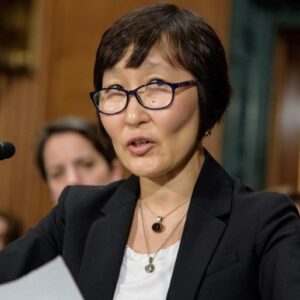In a newly-uncovered video, President Joe Biden’s nominee to help oversee the nation’s banking system says that if small U.S. oil and gas companies went bankrupt, that would be a good thing.
It’s a suggestion that in the current climate — gasoline prices soaring and some consumers looking at 50 percent hikes in energy costs this winter – may not be such a “good thing” for getting her nomination through a 50-50 Senate.
Saule Omarova, tapped by Biden to run the Office of the Comptroller of the Currency, has been embroiled in controversy since her nomination was first announced. While she did hold a minor role in the George W. Bush Treasury Department, her economic resume is nontraditional at best.
While a student at Moscow State University (Moscow, Russia, not Moscow, Idaho) where she was a “V.I. Lenin Personal Academic Scholarship” recipient, Omarova wrote her thesis on “Karl Marx’s Economic Analysis and the Theory of Revolution in The Capital.” Now that she’s been nominated to one of the top financial positions in the administration, Republican senators like Pat Toomey, a Pennsylvania moderate, want her to release a copy as part of the vetting process.
Thus far, she has refused.
“Republicans will overwhelmingly oppose this self-described radical,” Toomey said last month. Professor Omarova “has been celebrated on the far left for promoting ideas she herself has described as radical,” including advocating for “effectively end[ing] banking as we know it.”
Now a video of Omarova addressing the Jain Family Institute’s 2021 Social Wealth Seminar in March has raised new concerns.
“Here what I’m thinking about is primarily coal industry and oil and gas industry,” said Omarova in a video clip unearthed by American Accountability Foundation (AAF). “A lot of the smaller players in that industry are going to probably go bankrupt in short order — at least, we want them to go bankrupt if we want to tackle climate change.”
Omarova went on to say that “we cannot afford” the economic fallout and job losses that would ensue if the U.S. were to bankrupt oil companies. But given her progressive politics — she’s proposed having all private bank deposits go to the federal government in order to “democratize money” — her sentiments are hard for the energy sector to ignore.
“This is ludicrous,” says Dan Weaver, president and executive director of Pennsylvania Independent Oil & Gas Association, a membership organization with businesses large and small, some of them family-owned operations. “That idea is preposterous and sickening, to say the least.”
“This is a reminder that there are opponents of oil and gas who are in high positions or seeking high positions in the Biden administration,” says Dan Kish of the Institute for Energy Research (IEA) and American Energy Alliance (AEA). “I think people see that at the pump. They’ve seen reports that they’re going to pay more this winter.”
The timing of the new revelation is problematic for Biden and his Democratic allies. The White House has taken several high-profile actions to discourage domestic fossil fuel production, even as consumers have been hit with higher gasoline prices and warnings that home heating costs this winter will soar.
The Biden administration even asked OPEC to increase production to help people dealing with high gas and heating oil prices. OPEC declined, leading critics to say the administration should rethink its steps against domestic oil and gas production.
Locally, U.S. Senate candidate Dr. Valerie Arkoosh is calling for a statewide ban on fracking, despite the billions in economic impact from the industry.
“We’ve already seen Keystone XL pipeline workers lose their jobs, we’ve seen people’s businesses and their family budgets hurt by higher gas prices and ultimately that’s the game,” says Kish. “The game is to drive energy costs to skyrocketing levels and make it very difficult for people to use a kind of energy they use in the hopes that they’ll go and use the stuff that they want to use.
“Natural gas generation is leading to a cleaner atmosphere,” added Weaver, pointing to data from EIA. “The science is there, and if we were to ‘bankrupt’ all the oil and gas companies here, where is the energy coming from? What about the thousands of products that we use every day that don’t come from anything other than those feedstocks?”
The White House continues to back the troubled nomination. “Saule Omarova is eminently qualified and was nominated for this role because of her lifetime of work on financial regulation, including in the private sector, in government, and as a leading academic in the field. The White House continues to strongly support her historic nomination,” they said in a statement to Fox News.
And while Toomey has been an outspoken opponent, Pennsylvania’s other senator, Democrat Bob Casey, has been silent.
All things considered, Kish says it does not surprise him that somebody connected to the Biden administration feels this way about oil and gas.
“What surprises me is that she mistakingly said it publicly, or at least in a way that became public,” says Kish. “I don’t think she expected it to become public.”

